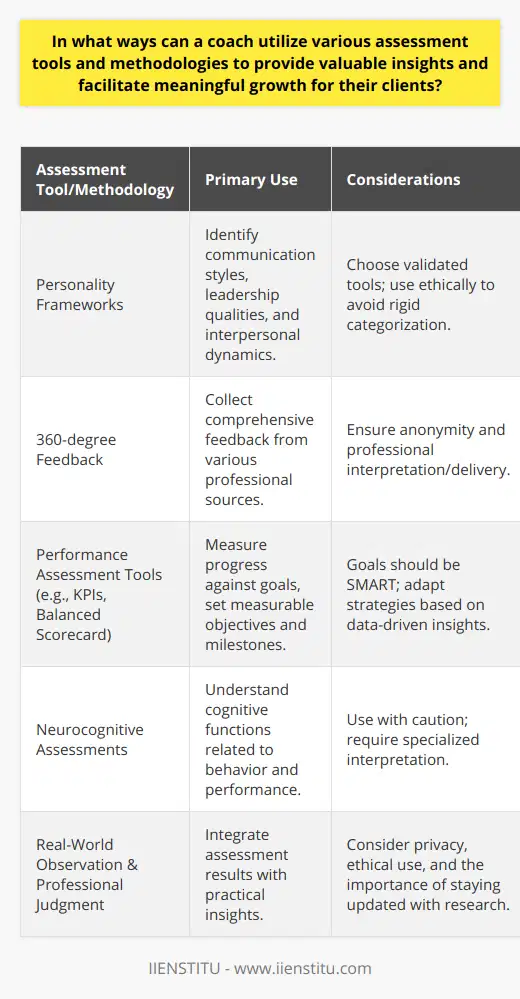
Are you thinking about becoming a professional coach? If so, there are some essential things you need to know to be successful. This blog post will share 20 tips to help you launch your coaching career. So, whether you are just getting started or looking to take your business to the next level, read on for advice from the pros!
Are you ready to become a professional coach? Follow these essential steps to get started.
Professional coaching is a rapidly growing field that focuses on helping individuals and organizations reach their full potential. Coaches work with clients to set goals, develop strategies, and overcome barriers to success. The core of this type of coaching focuses on building intrinsic motivation and supporting personal growth and development.
Unlike a traditional manager or supervisor, who may focus primarily on task completion and performance metrics, a professional coach takes a holistic view of an individual's strengths, weaknesses, and goals. Whether working with individuals or teams within an organization, a professional coach plays an essential role in helping people to realize their full potential truly.
Whether it is helping someone achieve a lifelong dream or guiding an entire team through significant change, the work of a professional coach can have far-reaching implications for both individuals and organizations alike. So if you are looking for support in achieving your personal or professional goals, consider seeking out the guidance of a qualified coach today. With the right combination of support and guidance, there is no limit to what you can accomplish.
1 - Establish yourself as an authority in your field.
As a professional coach, it is essential to establish yourself as an authority in your field. This involves staying up-to-date with the latest trends and techniques and gaining recognition from your peers. One way to do this is through professional certifications and accreditations. In addition, completing training workshops and continuing education programs will show that you are dedicated to learning and improving.
Still, it will also help you stay at the top of your game and deliver results for your clients.
Additionally, building relationships with other professionals can also go a long way in establishing yourself as an authority in your field. By connecting with others on social media or professional networking sites, you can increase your reach and showcase your expertise to a broader audience. Overall, by continually investing in yourself as an expert in your field, you can establish yourself as an authority.
2 - Develop a coaching philosophy and approach that resonates with you.
Developing a coaching philosophy and approach that resonates with you is essential when you start as a coach. This will be the foundation for your work as a coach and guide you in interacting with clients. To develop your coaching philosophy, start by asking yourself what values and principles you want to uphold as a coach.
Next, consider what methods and techniques you feel most strongly about and how you can integrate them into your coaching practice. Additionally, it can be helpful to read about different coaching philosophies and approaches to get some ideas. Once you have developed a coaching philosophy that feels right for you, stick to it and let it guide your work.
3 - Build a network of supportive colleagues and mentors.
As a professional coach, it is essential to build a network of supportive colleagues and mentors who can guide the way. By connecting with other coaches, you will be able to develop relationships that last beyond just one client and gain valuable insights into your profession.
Additionally, by building up a robust support system of fellow professionals, you will gain access to new resources and opportunities that may help you succeed in your career.
4 - Get certified or accredited as a coach.
To truly stand out as a professional coach, consider getting certified or accredited by an established organization in your field. This will show potential clients that you have the necessary training and experience for coaching and send the message that you are serious about your work.
There are several different coaching certifications and accreditation programs available, so take some time to research your options and find one that feels right for you.
5. Invest in continuing education opportunities as a coach.
Regardless of how long you have been working as a coach, it is essential to continue investing in yourself and your development. This will help keep you up-to-date with the latest trends and techniques, but it can also open new doors for growth and advancement in your career. One way to stay supported as a professional coach is by attending training workshops or conferences on an ongoing basis.
Additionally, joining online forums or discussion groups related to your profession can help you continue your education.
6. Develop a robust online presence as a coach.
It is more important than ever for coaches to develop a solid online presence in today's digital age. By having an active website and social media accounts, you can reach a wider audience of potential clients and show them what you offer as a coach.
Furthermore, by regularly creating and sharing content related to coaching, you can establish yourself as an authority in your field and build trust with potential clients. Overall, by investing in your online presence as a coach, you can reach new heights in your career.
7. network with other professionals in your field.
Like any other profession, networking is critical for success as a coach. By connecting with other professionals in your field, you can learn from their experiences and access new resources that may help you along your journey.
Some practical ways to network as a coach include attending training workshops and conferences, joining online forums or discussion groups, and seeking mentors who can provide guidance and support.
Additionally, leveraging the power of social media platforms such as LinkedIn or Facebook can be an effective way to connect with other coaches in your area or industry. As a professional coach, it is crucial to make networking a regular part of your routine to achieve success in your career.
8 - Invest in ongoing education and professional development.
To continue growing as a coach, it is essential to invest in ongoing education and professional development. By attending training workshops or conferences, you can learn new techniques and strategies that may help you stay competitive in your career.
Additionally, by finding more experienced mentors than you and learning from their experiences, you can develop yourself as an effective coach.
9 - Stay current with the latest trends in coaching.
As a professional coach, it is essential to stay up-to-date with the latest trends in your industry to continue delivering valuable services to your clients. Some ways to keep informed about new developments in coaching include reading articles online and subscribing to popular blogs or newsletters related to the field.
Additionally, by attending training workshops and conferences, you can gain exposure to the latest trends and learn from some of the top experts in the coaching industry.
10 - Leverage social media platforms to reach new clients.
In today's digital age, social media platforms such as LinkedIn or Facebook can be powerful tools for reaching new clients as a coach. By regularly creating and sharing content related to coaching on these platforms, you can establish yourself as an authority in your field and attract potential clients worldwide.
Additionally, by connecting with other professionals in your area, you can expand your network and access new resources that may help you grow your business. Overall, by leveraging the power of social media, you can take your coaching business to new heights.
11 - Manage your time and energy wisely.
As a coach, it is essential to manage your time and energy to focus on matters wisely. One effective way to do this is by creating a detailed schedule for yourself at the start of each day, outlining your top priorities and how much time you plan to spend on each activity.
Additionally, by dividing your time across different projects or clients in an organized manner, you can ensure that you stay focused and accomplish everything that needs to get done as efficiently as possible. Finally, as tempting as it may be at times, it is also essential to avoid becoming overwhelmed with too many tasks or projects simultaneously to maintain balance in your life.
12. Develop excellent communication skills.
It is crucial to develop excellent communication skills to communicate with your clients effectively as a coach. Some essential aspects of good communication as a coach include active listening, using clear and concise language, being honest and transparent, and responding promptly to inquiries from your clients.
Additionally, by establishing a solid rapport with your clients from the start of their coaching journey, you can help them feel more comfortable opening up to you about their needs and goals. Overall, having strong communication skills can be a critical factor in becoming an effective coach.
13. Set realistic goals for yourself and your clients.
As a professional coach, it is essential that you set realistic goals for both yourself and your clients so that they can achieve success over time. One way to do this is by breaking down larger goals into smaller, more manageable steps so that your clients can stay motivated and on track towards achieving their overall objectives.
Additionally, by setting clear milestones and deadlines for each step along the way to success, you can help your clients stay focused and motivated in any challenges they may encounter. In short, when it comes to goal-setting as a coach, the key is to be realistic while still providing your clients with enough structure and support to help them achieve their desired results.
14. Be patient and supportive with your clients.
As a coach, one of the most important things you can do is be patient and supportive with your clients as they work towards achieving their goals. This means providing encouragement and positive reinforcement when they progress while also understanding and accepting if they encounter setbacks.
Additionally, by being a consistent source of support for your clients, you can help them stay motivated and focused on their goals, even when things get tough. Ultimately, your goal as a coach should be to help your clients find success in their lives, no matter how long it takes or how many challenges they face.
15. Keep your own life balanced and fulfilled.
To be a successful coach, it is essential to keep your own life balanced and fulfilled to be a positive role model for your clients. This means physically, mentally, and emotionally and making time for activities that you enjoy outside of work.
Additionally, by maintaining healthy relationships with your family and friends, you can ensure that you have a robust support system to rely on when things get tough. Ultimately, if you want to help your clients find success in their lives, it is important to model what a balanced and fulfilling life looks like for yourself first.
16. Be flexible and adaptable in your approach.
As a coach, it is essential to be flexible and adaptable in your approach to meet the needs of your clients effectively. This means being open to trying new techniques and strategies for helping your clients, recognizing when specific methods may not work, and adjusting your approach accordingly.
Additionally, by maintaining an attitude of curiosity, you can remain flexible in the face of unexpected challenges or opportunities that arise during coaching sessions. Ultimately, as a coach, it is essential to be flexible to stay updated on current trends in the field and adapt your services to meet the changing needs of your clients over time.
17. Seek out professional training opportunities regularly.
To become a successful coach, it is essential to regularly seek out professional training opportunities. This could include attending conferences or networking events focused on coaching or taking online courses or workshops that can help you stay on top of new developments in the field.
Additionally, by attending training sessions and keeping up with the latest research in coaching, you can ensure that your coaching skills are always up-to-date and relevant to your clients' needs.
18. Maintain high ethical standards as a coach.
As a professional coach, one of the most important things you can maintain high ethical standards. This means being honest and straightforward with your clients about their progress or setbacks and avoiding any conflicts of interest that could compromise your ability to provide adequate support for them.
Additionally, it is essential to be aware of any potential legal issues related to privacy regulations or client confidentiality and to take steps to ensure that you are continually operating within the bounds of the law. Ultimately, by maintaining high ethical standards as a coach, you can help protect yourself and your clients from any potential harm that could come from unethical coaching practices.
19. Stay up to date on new developments in the coaching field.
To be a successful coach, it is essential to stay up to date on new developments in the field to incorporate them into your practice. This could include reading professional journals, attending conferences focused on coaching, or taking online courses or workshops related to new trends in the field.
Additionally, keeping up with the latest research in coaching ensures that your knowledge and skills are always current and relevant to your clients' needs.
20. Set goals for yourself and make a plan for achieving them.
To be a successful coach, it is essential to set goals for yourself and develop a plan for accomplishing them. This could include working towards higher levels of certification or accreditation in the field or taking steps to build up your professional network through networking events or conferences.
Additionally, by outlining specific steps that you can take each day or week to move toward your goals, you can ensure that you are always staying on track towards accomplishing everything that you want in your career as a coach. Ultimately, by setting clear goals and following an action plan for achieving them, you can help ensure continued success as a professional coach.
Becoming a successful life coach takes time, effort, and dedication. But, if you're willing to put in the work, we believe you can achieve your goals. We hope this article has helped give you a better understanding of what it takes to be a successful life coach and some tips on getting started. Also, don't forget to check out our life coaching course for more information on how to build a thriving coaching practice. Thanks for reading!
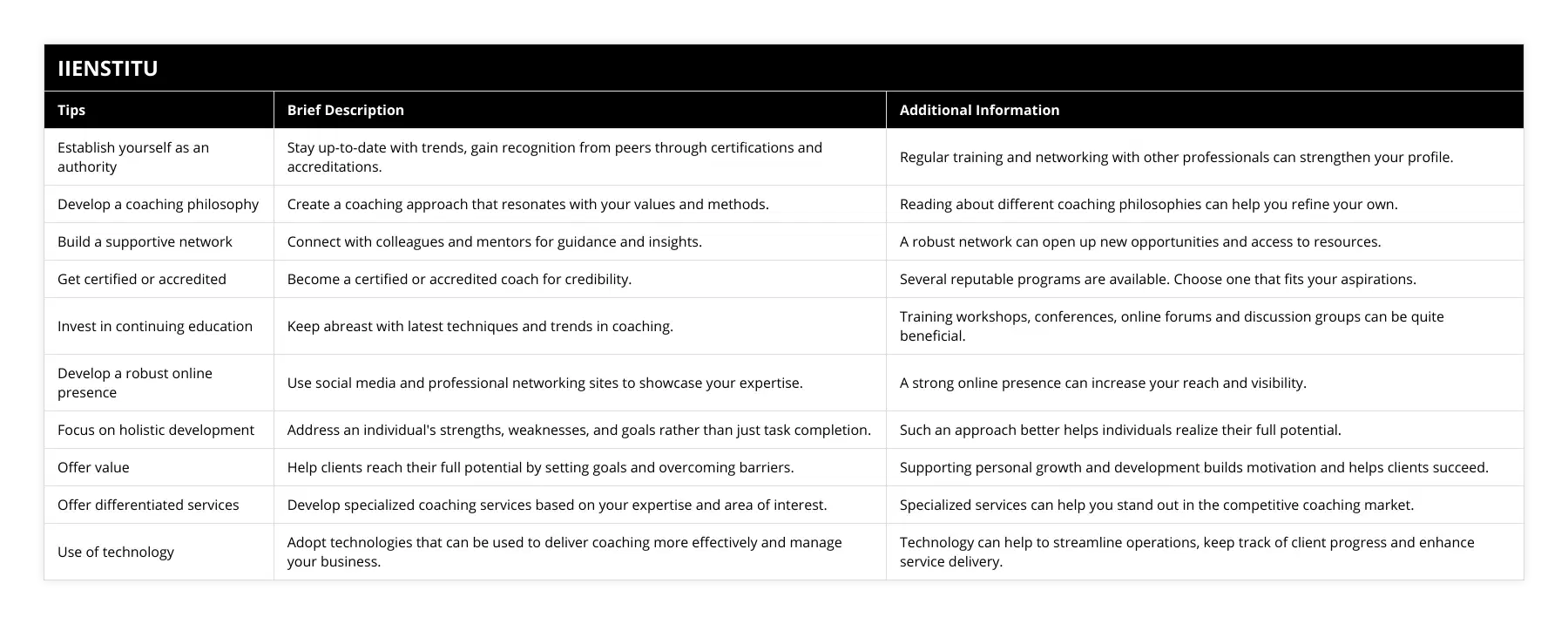
Frequently Asked Questions
What are the most important steps for getting started in coaching?
The most important steps for getting started in coaching are to first become familiar with the different types of coaching, learn the coaching process, and develop your skills as a coach.
The first step is to become familiar with the different types of coaching. There are many different types of coaching, such as life coaching, career coaching, executive coaching, sports coaching, health and fitness coaching, and so on. Once you have a basic understanding of the different types of coaching, you can then learn about the specific process involved in each type of coaching.
The next step is to develop your skills as a coach. Coaching is a skill that can be learned and improved over time. There are many different resources available to help coaches improve their
How can someone become a successful coach?
A successful coach is someone who can help their clients achieve their desired outcomes. Coaches need to be patient, have good communication skills, and be able to adapt to different personalities.
It's also important for coaches to have a good understanding of human behavior and how people interact with one another. Additionally, coaches should have a strong work ethic and be able to maintain their composure in difficult situations. Lastly, coaches should always strive to continue learning and developing new skills.
How can someone become a successful coach?
A successful coach is someone who can help their clients achieve their goals. To become a successful coach, you need to be able to:
- Effectively motivate and inspire your clients
- Understand what your clients want to achieve and help them set realistic goals
- Help your clients develop the skills they need to succeed
- Hold your clients accountable and provide support and guidance when needed
Coaching is a profession that takes time and practice to master. If you're interested in becoming a coach, start by studying the coaching process and learning as much as you can about effective coaching techniques. Try working with some friends or family members who are willing to be your guinea pigs, and ask for feedback so you can improve your coaching skills
What should I do to become a professional coach?
Developing Expertise in Coaching
To become a professional coach, it is crucial to acquire a strong foundation in coaching theory and practice. This can be achieved through pursuing relevant education and training programs in coaching, human psychology, and behavior. There are various coaching certifications and diplomas offered by recognized institutions, such as the International Coach Federation (ICF), which can provide the necessary knowledge and skills for effective coaching.
Building Experience
Aside from formal education, practical experience is essential in honing one's coaching abilities. Volunteering or interning with established coaches or coaching organizations can provide valuable insights into coaching techniques and methodologies. Additionally, working on personal projects or coaching small groups can further enhance one's coaching skills.
Expanding Networking Connections
Networking plays a significant role in the coaching industry. Attend industry events, conferences, and workshops to meet and learn from other professionals in the field. Building strong connections with experienced coaches can lead to mentorship opportunities, collaborations, or even referrals for potential clients.
Continuous Learning
The coaching landscape is constantly evolving; thus, staying updated on the latest industry trends, research, and innovations can benefit a professional coach. Participate in online forums, read coaching blogs, and subscribe to coaching journals to maintain a robust understanding of the field. Additionally, engage in personal development and reflection to enhance self-awareness and leadership capacity.
Specialization and Branding
Different coaching niches exist, such as business coaching, life coaching, or sports coaching. Identifying a specific area of expertise and tailoring one's coaching practice around that niche can lead to successful client outcomes. Develop a personal coaching brand by defining a unique coaching philosophy and style, and using it consistently across marketing materials and coaching sessions.
Setting Up the Business
Finally, establish a professional coaching business by registering the company, setting fees, and developing marketing strategies. Utilize various platforms, including social media, online advertisements, and content marketing, to promote the coaching practice and attract potential clients. Additionally, ensure legal, ethical, and regulatory compliance by familiarizing oneself with industry standards and guidelines.
In conclusion, becoming a professional coach involves acquiring relevant knowledge and skills through education and experience, networking with industry professionals, maintaining continuous learning, specializing in a niche, and setting up a coaching business. By fulfilling these crucial steps, one can develop a successful and rewarding career in the coaching industry.
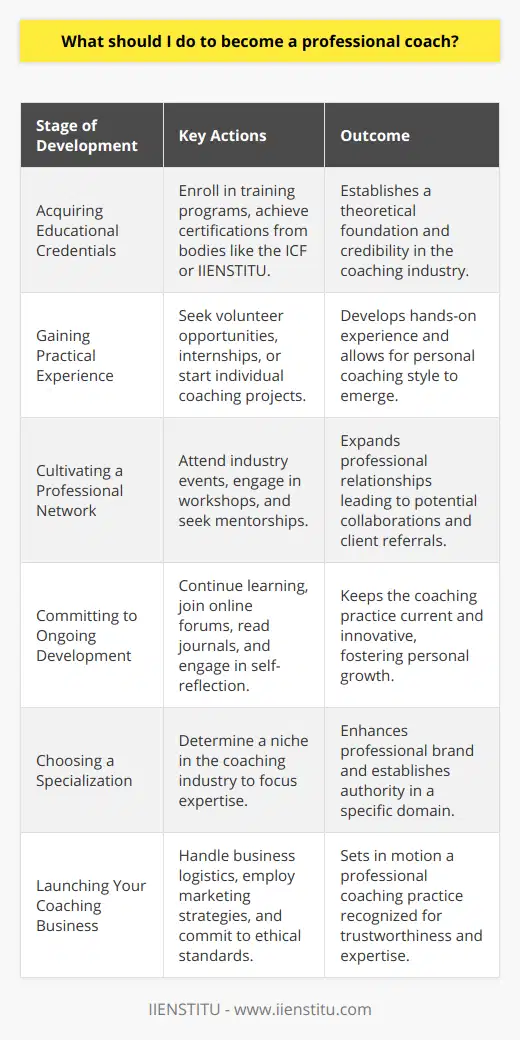
What are the 4 major skills that are needed to be a successful coach?
**Skill 1: Effective Communication**
The first skill required for a successful coach is effective communication. This involves clearly conveying information, listening actively, and providing constructive feedback. A coach must be able to communicate their expectations and goals, while also understanding the needs and concerns of their athletes. This two-way communication is essential for building a strong coach-athlete relationship and fostering a positive learning environment.
**Skill 2: Teaching and Instruction**
The second skill is the ability to develop and deliver effective teaching and instruction strategies. A successful coach must possess a deep understanding of their sport, including techniques, tactics, and strategies. They should be able to breakdown complex concepts and skills into simpler components, making it easier for athletes to understand and learn. Additionally, a coach must be able to identify individual learning styles and adapt their teaching methods accordingly to maximize each athlete's potential.
**Skill 3: Leadership and Motivation**
The third skill required is strong leadership and motivational abilities. A successful coach inspires and encourages their athletes to reach their full potential, both physically and mentally. They set high standards, establish clear goals, and outline a path to success. Through their own behavior and actions, a successful coach serves as a positive and influential role model, earning the respect and trust of their athletes.
**Skill 4: Adaptability and Flexibility**
Finally, a successful coach must be adaptable and flexible. Sports environments can be unpredictable, and a coach must be able to think critically and make informed decisions under pressure. This includes adjusting coaching strategies, managing unforeseen challenges and adapting to the needs and abilities of their athletes. A successful coach recognizes that each athlete is unique and employs a flexible approach to achieve the best possible outcomes for each individual.
In conclusion, to be a successful coach, one must possess effective communication, teaching and instruction, leadership and motivation, and adaptability and flexibility skills. These abilities allow a coach to navigate the complex and dynamic world of sports, facilitate the growth and development of athletes, and ultimately achieve success in the field.
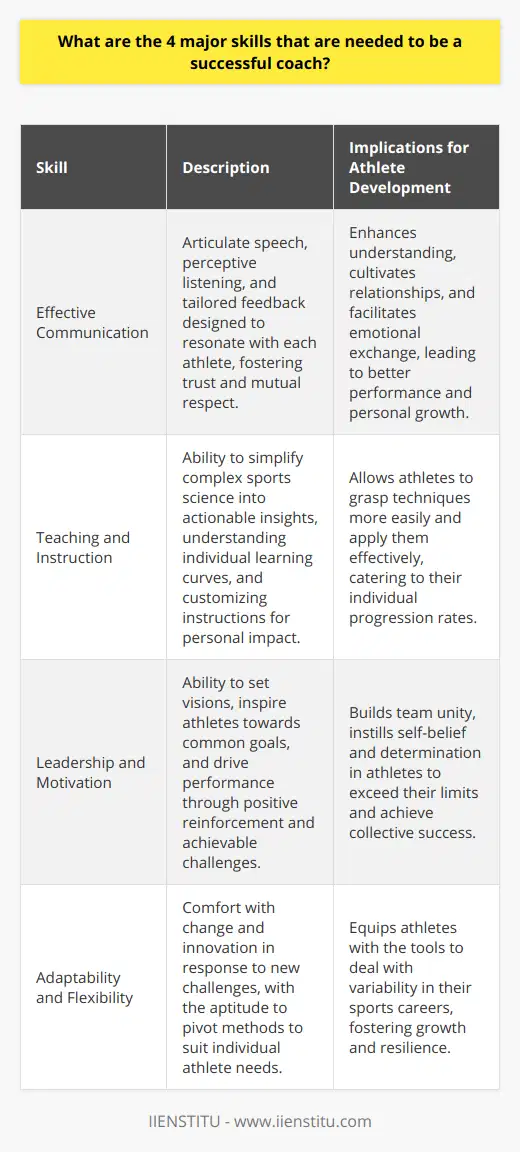
What are the 5 essentials to effective coaching?
Understanding Effective Coaching Strategies
Effective coaching is crucial in fostering a supportive work environment, enhancing personal and professional growth, and unlocking an individual's potential. Five essentials to effective coaching include establishing trust, effective communication, goal setting, utilizing observation and feedback, and fostering motivation and self-improvement.
Building Trust Through Environment
Establishing trust is a vital initial step in the coaching process that allows for an open and supportive environment. The coach must create a safe space for employees to share their concerns and goals without fear of judgment or reprimand. Trust enables better communication and rapport between coach and employee, fostering a successful partnership.
Enhancing Communication Skills
Effective communication is essential in transmitting clear expectations to employees and ensuring their understanding of a coach's perspective. Coaches must be skilled in active listening, asking probing questions, and providing constructive feedback. Transparent communication builds trust and helps employees develop their problem-solving and critical-thinking abilities.
Structured Goal Setting Process
Goal setting is a fundamental aspect of coaching, as it encompasses an employee's growth, development, and performance. The coach should work with the individual to create clear, realistic, and measurable objectives that align with their personal and professional goals. Establishing targets helps build commitment, provides motivation, and allows for focused efforts.
Utilizing Observation and Feedback
Effective coaches continuously observe and evaluate an employee's progress, adjusting their approaches and interventions accordingly. Providing timely, constructive feedback is essential for addressing areas of improvement while also acknowledging achievements. A feedback-rich environment encourages employees to reflect, develop skills, and enhance their performance.
Fostering Motivation and Self-Improvement
Lastly, coaches must strategically foster motivation and stimulate a desire for self-improvement within employees. By identifying employee strengths and areas for growth, the coach can craft tailored development plans that stimulate personal and professional growth. This promotes a culture of continuous learning and results in increased commitment, job satisfaction, and overall performance.
In conclusion, the five essentials to effective coaching – trust, communication, goal setting, observation and feedback, and motivation – work synergistically to develop valuable employees and enhance performance. An investment in the coaching capabilities of an organization ultimately contributes to its long-term success and employee satisfaction.
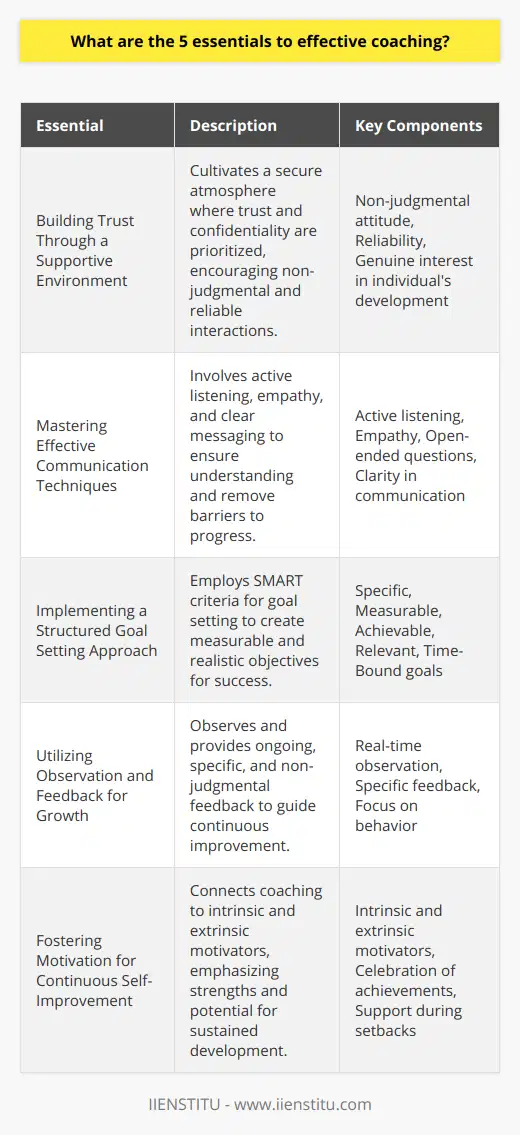
What should I do to become a professional coach?
**Establish Clear Goals**
To become a professional coach, begin by establishing clear goals surrounding your desired coaching profession, whether it be in the realms of sports, business, or personal development. Considering the specific industry you wish to enter can help guide your actions and decisions moving forward.
**Acquire Relevant Education and Training**
Next, focus on acquiring the necessary education and training relevant to your chosen field. Pursue formal qualifications, such as degrees, diplomas, or certificates in fields such as psychology, sports science, or business management, as these may be prerequisites for certain coaching positions.
**Gain Practical Experience**
Simultaneously, seek practical experience in your chosen coaching field. This may involve volunteering or working part-time as a coach while completing your studies. Practical experience will allow you to apply your theoretical knowledge and further develop your coaching skills, preparing you for professional success.
**Pursue Coaching Certifications**
In many cases, it is advantageous to pursue coaching certifications that attest to your coaching knowledge and expertise. Examples of popular certifications include the International Coach Federation (ICF) credential for life and business coaches, or the various National Governing Body (NGB) certifications for sports coaches. These qualifications can enhance your credibility and employability in your chosen field.
**Develop Strong Interpersonal Skills**
As a coach, strong interpersonal skills are crucial. Developing your communication, active listening, and empathy skills will enable you to effectively support and guide your clients. Additionally, honing your emotional intelligence and adaptability will help you better understand others' needs and adjust your approach accordingly.
**Network and Market Yourself**
As with any profession, networking is essential to becoming a successful coach. Attend industry events, join professional organizations, and create an online presence to connect with other professionals in your field. By marketing yourself, both online and offline, you can build valuable relationships and attract potential clients.
**Engage in Continuous Professional Development**
Lastly, commit to continuous professional development to keep your coaching knowledge and skills up-to-date. Staying informed on industry trends, attending workshops and conferences, and seeking regular feedback from peers and clients will help you grow and adapt as a coach. This ongoing learning will ensure you remain a sought-after professional within your field.

What are the 5 skills of coaching?
Effective Coaching Skills
In the realm of coaching, there are five essential skills that are instrumental in guiding and motivating individuals to achieve their goals. These skills encompass active listening, effective questioning, empathy, goal setting, and feedback.
Active Listening
The first and foremost skill is active listening, which refers to paying complete attention to the individual's thoughts and feelings while being fully present in the conversation. This skill enables coaches to gain a deep understanding of their clients, leading to an effective coaching experience. Active listening involves not only hearing the words spoken but also identifying the emotions and body language behind them.
Effective Questioning
The second skill, effective questioning, focuses on asking thought-provoking and open-ended questions to stimulate reflection and promote self-discovery. It empowers the individual to explore their thought process, beliefs, and values, leading to growth and development. Moreover, effective questioning facilitates insightful discussions, allowing the individual to identify their strengths and areas in need of improvement.
Empathy
Empathy constitutes a crucial coaching skill, as it enables coaches to put themselves in the individual’s shoes, understand their emotions and perspectives, and create a supportive and non-judgmental environment. By demonstrating empathy, coaches foster trust among their clients and allow them to openly express themselves, leading to stronger relationships and better results.
Goal Setting
An essential part of coaching is guiding individuals to set clear, realistic, and measurable goals that align with their interests and values. Goal setting serves as a roadmap to success and a source of motivation, providing individuals with a sense of purpose and direction. Additionally, it allows coaches to tailor the coaching process to meet each individual’s unique needs and aspirations.
Feedback
Lastly, providing constructive and timely feedback is vital in the coaching process. The ability to give valuable feedback allows coaches to target areas for improvement, support individuals in recognizing their progress, and motivate them to stay on track. By offering feedback grounded in observation and evidence, coaches contribute to the growth and development of the clients, helping them achieve their objectives.
In conclusion, coaching is a dynamic process that requires proficiency in essential skills such as active listening, effective questioning, empathy, goal setting, and feedback. Utilizing these skills effectively fosters a supportive environment that empowers individuals to recognize their potential and strive for growth while creating strong and lasting relationships between the coach and the client.
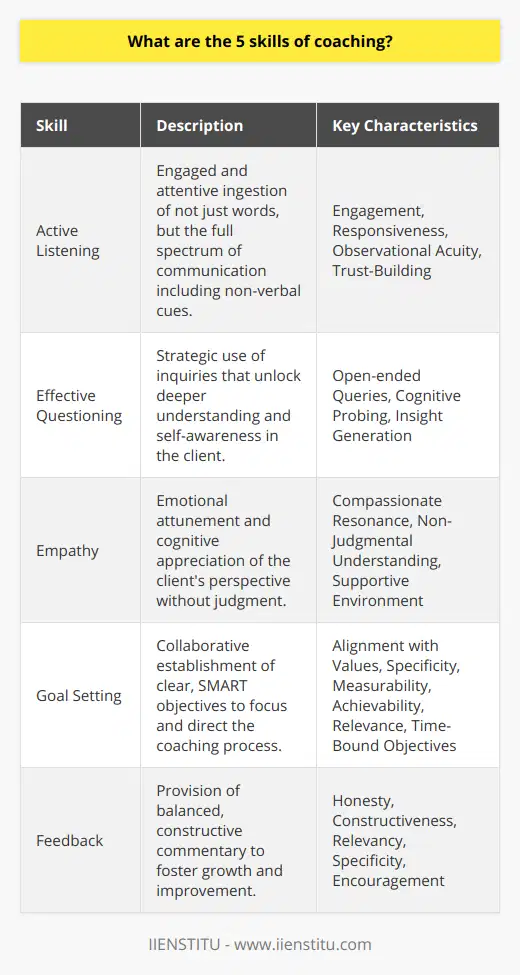
What are the 4 types of coaching?
Four Types of Coaching
Individualized Coaching
Individualized coaching focuses on the unique needs of the coachee. This approach customizes the coaching process to address specific goals, challenges, and areas for development. It involves a personalized assessment of strengths and areas for improvement, followed by a targeted plan for growth.
Team Coaching
Team coaching supports the development of a group or team in achieving its collective goals. With team coaching, a coach works alongside team members to enhance communication, collaboration, and performance. This type of coaching emphasizes the identification and resolution of group dynamics or conflicts, helping to create a high-performing and cohesive team.
Skills-Based Coaching
Skills-based coaching, as the name suggests, concentrates on developing or improving specific skills. This type of coaching targets abilities such as communication, problem-solving, leadership, or technical skills. Through one-on-one or group sessions, a coach facilitates the learning of new techniques, tools, and practices and supports the application of these skills in the coachee's day-to-day work.
Executive Coaching
Lastly, executive coaching focuses on supporting higher-level professionals, such as managers and executives, in their leadership capacities. This type of coaching assists leaders in navigating organizational challenges, making informed decisions, and devising strategies for professional and organizational success. It involves continuous reflection on their actions, behaviors, and impacts on others, encouraging growth and effective leadership.
In conclusion, there are four primary types of coaching: individualized, team, skills-based, and executive coaching. Each type serves a distinct purpose and targets specific areas of growth or development. The selection of the most suitable coaching method depends on the needs, goals, and contexts of the individuals and organizations involved.
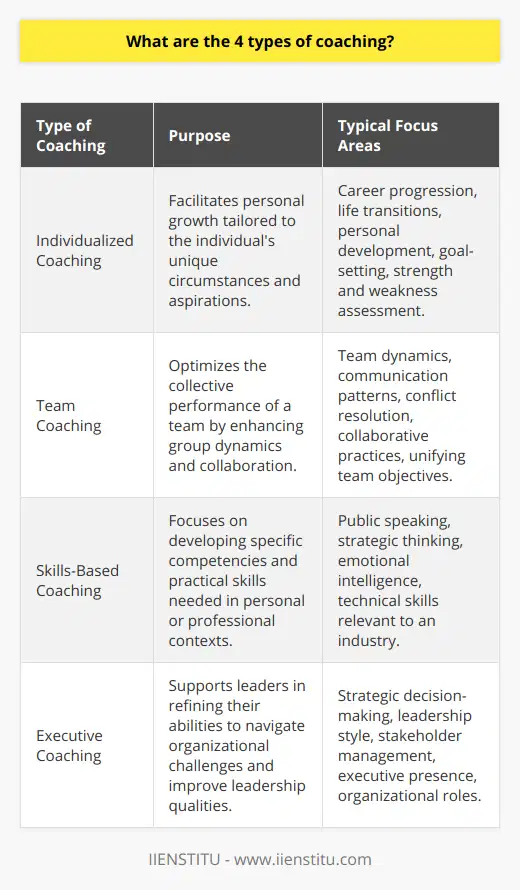
What do you need to be a professional coach?
Essential Skills for Professional Coaching
Effective Communication
To be a professional coach, one needs to possess exceptional communication skills. Coaches must have the ability to clearly articulate their thoughts, ideas, and feedback to clients while also being an active listener. Listening is crucial for understanding clients' needs and concerns, which allows the coach to tailor their approach accordingly.
Strong Interpersonal Skills
Building trust-based relationships is central to successful coaching. Coaches must demonstrate empathy, respect, and understanding when working with clients. Establishing rapport with clients facilitates open and honest dialogue, which fosters a conducive environment for growth and progress.
Goal Setting and Action Planning
A professional coach must be adept at helping clients set realistic, achievable goals and create actionable plans to reach them. This process involves breaking down larger objectives into smaller, manageable steps, and monitoring the client's progress along the way. Coaches must also be flexible and able to adjust their strategies as needed to accommodate changes in clients' circumstances or goals.
Knowledge of Coaching Techniques
Proficiency in various coaching techniques, models, and tools is essential for a successful coaching practice. Understanding different coaching methodologies allows coaches to design interventions suited to clients' unique needs and preferences. Furthermore, staying up-to-date with the latest advancements and research in the coaching field ensures that coaches can deliver evidence-based, effective support to clients.
Maintaining Confidentiality
Professional coaches have an ethical responsibility to maintain confidentiality with clients, as this promotes trust and openness in discussions. Adhering to professional codes of conduct and practicing discretion in all communications ensures that clients feel safe sharing sensitive information and personal challenges.
Continuous Professional Development
Being committed to continuous learning and professional development is vital for a coach's growth and success. Engaging in ongoing education, joining professional networks, and seeking mentoring or supervision helps coaches refine their skills, expand their knowledge, and remain informed about best practices in the coaching industry.
In conclusion, to be a successful professional coach, one must possess a range of essential skills: excellent communication, strong interpersonal abilities, goal-setting and planning expertise, knowledge of coaching techniques, adherence to confidentiality standards, and a commitment to continuous professional development. Building and refining these competencies enables coaches to effectively guide clients towards their goals, fostering positive outcomes and transformative growth.
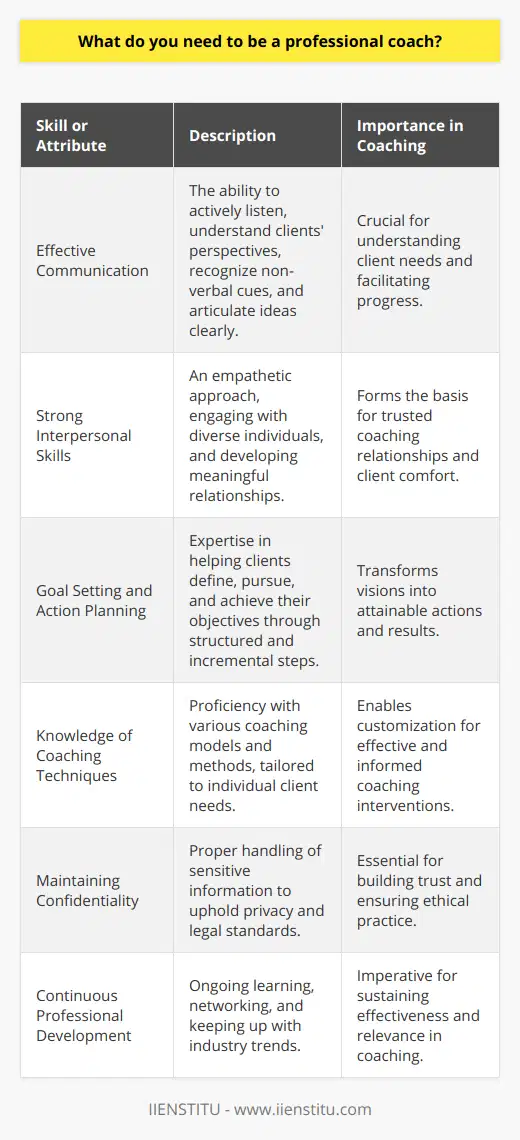
What are the 3 important aspects of coaching?
Effective Communication Skills
One vital aspect of coaching is having effective communication skills. They are integral to understanding and conveying ideas, concepts, and the necessary feedback to their trainees. Coaches must be able to articulate instructions clearly and concisely, while also fostering a supportive environment for the athletes or clients. Moreover, they should possess active listening skills in order to properly address any concerns or questions that may arise.
Adaptability and Flexibility
Another important aspect of coaching is adaptability and flexibility. Coaches must be able to adapt their approach based on the individual needs and strengths of their athletes or clients. This can entail modifying training programs, adjusting coaching style, or even altering communication methods. Furthermore, flexibility is essential in adapting to unexpected situations, such as injuries or changes in an athlete's performance. Being flexible ensures that coaches can adjust their strategies, keeping the athlete's development on track.
Empathy and Emotional Intelligence
Lastly, empathy and emotional intelligence are key aspects of successful coaching. Understanding the emotions, motivations, and experiences of athletes or clients allows coaches to foster strong connections and support their personal and professional growth. Emotionally intelligent coaches are able to recognize their own emotions and regulate them accordingly to provide a balanced and positive environment for those they coach. In addition, empathy enables coaches to better support athletes or clients through struggles and challenges, fostering trust and encouraging continuous improvement.
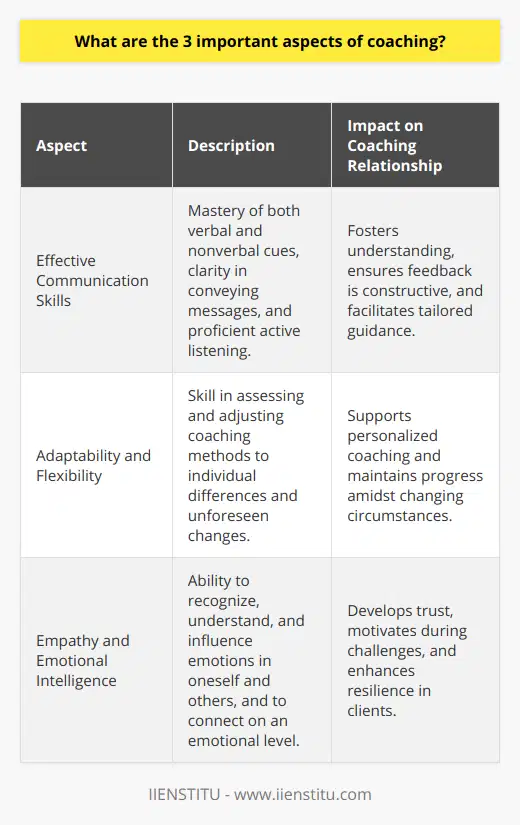
What are the 5 skills of coaching?
Effective Coaching Skills
In the realm of coaching, five essential skills contribute to successful outcomes for coaches and their clients. These skills include active listening, powerful questioning, direct communication, designing actions, and managing progress and accountability.
Active Listening
The first skill is active listening, which involves fully concentrating, understanding, and responding to what the client is saying. This skill allows coaches to grasp clients' concerns and needs, providing them a solid foundation to offer guidance and support.
Powerful Questioning
The second skill is powerful questioning. Coaches must be skillful in asking open-ended, thought-provoking questions that provoke reflection, exploration, and problem-solving in clients. Well-posed questions enable clients to come up with their own solutions and discover new perspectives.
Direct Communication
The third skill is direct communication. Coaches must be able to articulate their thoughts and ideas clearly, concisely, and honestly. Clarity, accurate language, and straightforwardness are crucial in promoting the client's understanding and facilitating meaningful dialogue.
Designing Actions
The fourth skill is designing actions. Coaches must be adept at helping clients create customized, step-by-step plans for achieving their goals. This skill involves identifying clients' strengths, resources, and potential obstacles to carefully design actions aligned with clients' values and aspirations.
Managing Progress and Accountability
The final skill is managing progress and accountability. Coaches must efficiently track the client's progress and make necessary adjustments to ensure continual growth and development. Furthermore, coaches must hold clients accountable, providing motivation and support to empower them in accomplishing their goals.
In conclusion, the five skills of coaching - active listening, powerful questioning, direct communication, designing actions, and managing progress and accountability - are fundamental to effective coaching relationships. By utilizing these skills, coaches can help clients achieve their goals, discover new perspectives, and succeed in personal and professional endeavors.

What knowledge should a coach have in order to be effective in their practice?
Understanding of the Sport
An effective coach should possess a deep and thorough understanding of the sport they are coaching. This encompasses the rules, tactics, techniques, and strategies required for optimal performance. Familiarity with the sport's history and current best practices is essential for coaches to provide informed guidance to athletes.
Interpersonal and Communication Skills
Critical to a coach's effectiveness is their ability to build trust and rapport with athletes through strong interpersonal and communication skills. Active listening, patience, and empathy are vital components of fostering a supportive and engaging environment where athletes can seek clarification, express concerns, and share their thoughts. Coaches should be skilled in conveying information, providing feedback, and explaining complex concepts in a manner that is easily understood by athletes.
Physical Aptitude and Technical Knowledge
An effective coach must exhibit physical aptitude and technical knowledge related to the sport. This involves demonstrating and teaching proper techniques, physical conditioning, and injury prevention methods. A coach's ability to tailor training programs and identify areas for improvement is contingent on their technical expertise and understanding of the biomechanics involved in the sport.
Motivational and Leadership Abilities
To inspire athletes to push their limits and achieve their goals, a coach should have strong motivational and leadership abilities. This includes setting realistic expectations, establishing a shared vision, and fostering a culture of accountability and perseverance. By acting as a role model and maintaining a positive attitude, an effective coach creates an environment that encourages athletes to strive for continuous improvement.
Adaptability and Critical Thinking
As each athlete is unique, a coach must be adaptable and skilled in critical thinking to address diverse needs, goals, and learning styles. Flexibility in modifying training plans and adjusting coaching methods, as well as being open to feedback and new ideas, is crucial for catering to individual athletes' requirements. Recognizing that there is no one-size-fits-all approach requires the coach to be creative and innovative in seeking alternative solutions as needed.
In conclusion, the knowledge that a coach should possess to be effective in their practice includes understanding of the sport, interpersonal and communication skills, physical aptitude and technical knowledge, motivational and leadership abilities, and adaptability and critical thinking. Armed with these competencies, a coach can provide athletes with valuable insights, guidance, and support that facilitate their growth and development, ultimately leading to improved performance.
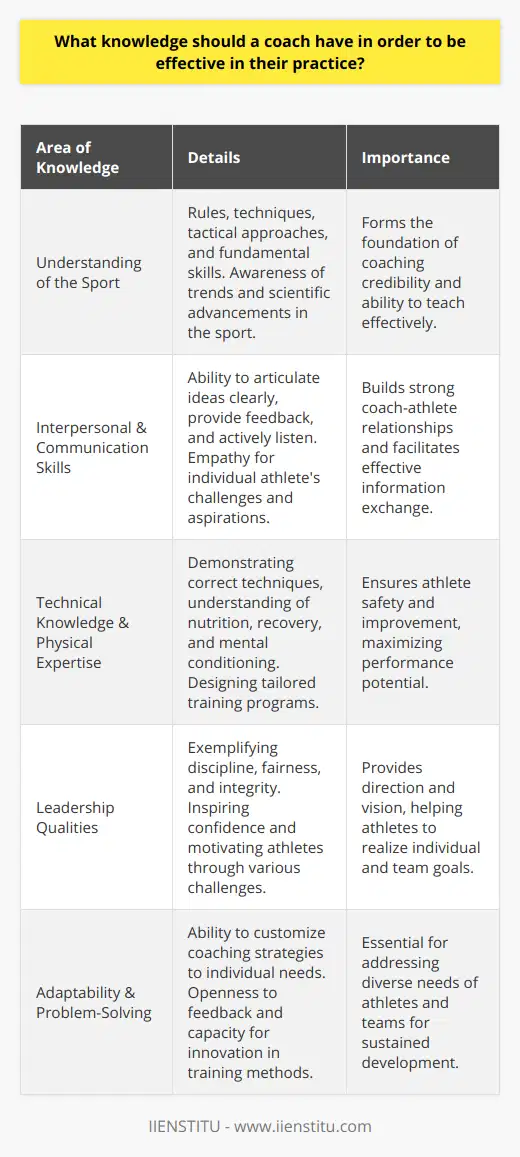
How do I establish myself as a reputable coach within my field or industry?
Define Your Coaching Niche
To establish oneself as a reputable coach within a specific field or industry, it is vital to define one's coaching niche. By identifying the target audience and determining the unique value proposition, a coach can focus on catering to the specific needs of that clientele. This niche identification helps differentiate the coach's services from others, thus building credibility within that field.
Improve Expertise and Skills
It is essential to refine your coaching skills to establish a strong reputation in the market. Acquiring relevant training and certifications, attending workshops, keeping aware of industry trends, and actively seeking feedback from clients are effective ways to achieve this continuous improvement. Moreover, fostering an in-depth understanding and expertise within your chosen field contributes significantly to your credibility.
Network within the Industry
Networking is a powerful tool used to establish connections within the industry. It can accelerate the process of gaining referrals, testimonials, and opportunities to partner with influential individuals, lending credibility to your coaching practice. Attend industry conferences and events, engage on social media, and contribute to discussions to increase your visibility and foster relationships with potential clients and influencers.
Build a Strong Personal Brand
A strong personal brand serves as a pillar of trust and authority for prospective clients. Invest in creating a professional website, developing an appropriate online presence, and consistently articulating one's values, mission, and coaching practices. This cohesive and authentic brand narrative will strengthen your credibility among your target audience.
Share Knowledge Through Multiple Channels
Sharing your expertise through various channels is an effective strategy for gaining recognition and showcasing your competence. Write blog posts, publish articles in industry publications, deliver webinars, and present at conferences to establish your thought leadership. Regularly sharing content also provides opportunities for potential clients to find you, as well as drive engagement with your existing followers.
Collect Client Testimonials
Having a set of positive and genuine feedback from past clients can significantly impact your reputation. Encourage your satisfied clients to share their experiences, write testimonials, or provide referrals. Showcasing these on your website, social media, and marketing materials will help demonstrate your coaching success and further establish your credibility in the field.
In conclusion, establishing a reputable coaching practice requires consistently providing value, refining skills, and engaging with industry peers and clients. By defining a niche, building a personal brand, and showcasing successes, you will be able to build a solid reputation within your chosen field or industry.
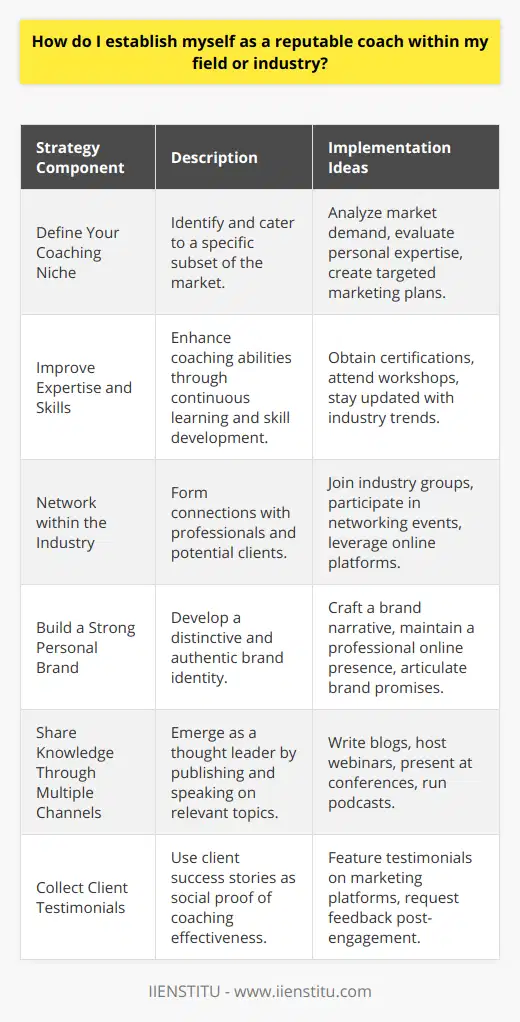
What are some practical tips for honing one's coaching abilities to better serve clients and build a successful practice?
Understanding Client Needs
To hone one's coaching abilities, it is essential to understand the specific needs of the clients. This understanding will inform the development of targeted strategies and interventions that address the clients' unique challenges and aspirations. Effective strategies include conducting initial assessments, actively listening to clients' concerns, and adapting coaching techniques to suit individual preferences.
Developing Communication Skills
Effective communication skills are at the core of any successful coaching practice. To build these skills, coaches should practice active listening, empathetic responses, and clear, concise expression. Engaging in open dialogues enables clients to feel heard and understood, enhancing trust and fostering deeper connections. Moreover, giving constructive feedback, employing positive language, and demonstrating emotional intelligence can go a long way in creating lasting client relationships.
Establishing Clear Goals
Goal setting is a crucial aspect of coaching, as it provides the framework for both coach and client to work together towards mutual success. To assist clients in achieving their objectives, coaches should encourage the setting of specific, measurable, achievable, relevant, and time-bound (SMART) goals. This approach ensures that goals are clear, tangible, and focused, increasing clients' motivation and perceived self-efficacy.
Implementing Continuous Evaluation
Ongoing evaluation of coaching effectiveness helps both the coach and the client assess progress and refine strategies. Regular feedback from clients, self-assessments, and professional development activities can provide valuable insights for enhancing coaching abilities. Moreover, revisiting and adjusting goals based on clients' progress will enable coaches to maintain a client-centered approach and optimize results.
Leveraging Technology
Utilizing technology can considerably enhance the coaching experience. With a plethora of tools, such as video conferencing, scheduling software, and collaboration platforms, coaches can streamline communication, scheduling, and resource sharing. By incorporating technology into their practice, coaches are able to provide convenient and flexible services, meeting clients' diverse needs and preferences.
Building Professional Network
Networking with other professionals in the coaching field is instrumental in fostering learning, growth, and success. By sharing best practices, advice, and resources, coaches can expand their knowledge, refine their skills, and generate referrals. Joining professional associations or attending conferences can also provide opportunities for continuous professional development and staying informed of emerging trends in coaching practice.
In conclusion, honing one's coaching abilities involves understanding and addressing client needs, developing effective communication skills, setting clear goals, continuously evaluating progress, leveraging technology, and building a professional network. These practical tips will enable coaches to better serve their clients, ultimately leading to a successful practice.
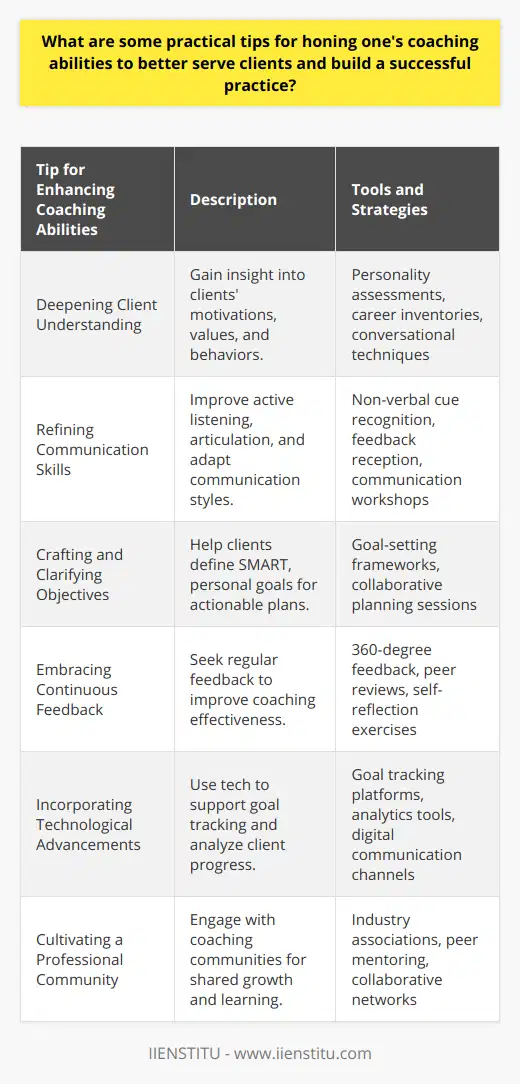
What are the essential qualities and characteristics needed to excel as a professional coach?
Effective Communication
A professional coach must have exceptional communication skills, enabling them to convey complex ideas simply. This involves clear speaking, active listening, and understanding body language.
Client Empowerment
A successful coach must empower and motivate clients. They should inspire self-belief, aiding clients in setting achievable goals. Empowerment involves developing clients’ self-confidence and resilience.
Ethics and Professionalism
A coach should uphold high ethical standards. They should respect client confidentiality, show empathy and remain non-judgmental. Maintaining professional boundaries, being reliable and timely, also exemplify professionalism.
Continuous Learning and Adaptability
Successful coaches embrace continuous learning, staying updated with the latest coaching strategies and theories. They should be adaptable, capable of customising approaches to meet diverse client needs. Adaptability involves being flexible and open-minded.
Results-Driven Approach
A professional coach should focus on results. They need to provide actionable strategies and monitor progress, ensuring accountability. Aiming for tangible outcomes and client satisfaction drives success.
Emotional Intelligence
Coaches should exhibit high emotional intelligence. This requires awareness of one’s emotions and the ability to manage them. It also involves understanding and responding to clients’ emotional needs.
In conclusion, essentials for excelling as a professional coach include effective communication, empowering clients, ethical and professional conduct, continuous learning, adaptability, a results-driven approach, and emotional intelligence. Each characteristic is equally vital, cohesively interacting to foster a productive coaching relationship. Broadening these skills can enhance a coach's impact, ultimately leading to client success and satisfaction.
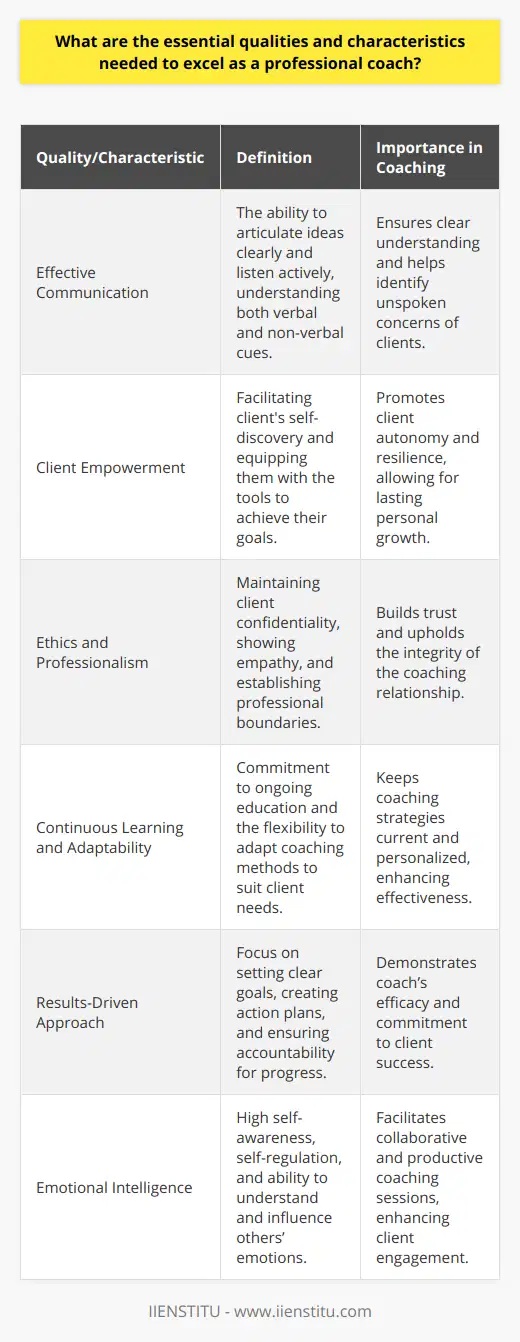
How can a coach effectively adapt their approach for different clients and scenarios?
Understanding Client Needs
A coach can adapt their approach effectively by first understanding the unique needs, goals, and constraints of each client. They should take time to listen to their clients and identify their specific requirements.
Adaptive Communication Styles
Variation in communication styles also plays a vital role in coaching. Every client perceives information differently. Coaches should adjust their communication methods to ensure clients understand the conveyed message effectively.
Employing Different Coaching Models
Coaches could also employ different coaching models for different scenarios. Some clients may need a more directive approach, while others may benefit more from a non-directive style. The choice of model should align with the client's preferred style of learning and their specific goals.
Customizing Strategies
Customizing strategies according to the personality type, age, and professional background of the client can be another effective way for coaches to adapt their approach. This customizing ensures the strategies are relevant and appealing to the client.
Incorporating Feedback Mechanisms
Feedback mechanisms are crucial for adapting coaching approaches. Regular feedback from the client allows the coach to modify their approach efficiently, ensuring the coaching remains aligned with the client's evolving needs.
Building Trust and Rapport
Building trust and rapport with clients enables coaches to better understand their client's perspectives, thereby enhancing their ability to adapt their approach effectively. Trust and rapport make clients more receptive to the coach's guidance, facilitating better outcomes in their self-improvement journeys.
In conclusion, coaches can effectively adapt their approach by understanding their client's unique needs, varying their communication style, employing different coaching models, customizing strategies, incorporating feedback mechanisms, and building trust and rapport.
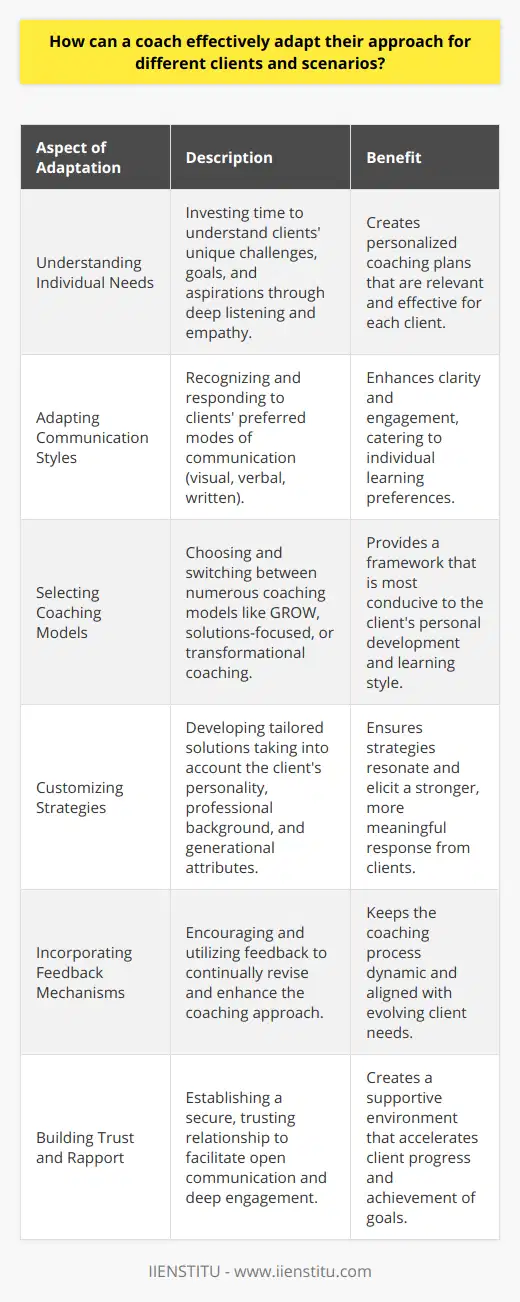
In what ways can continuous professional development and self-reflection enhance one's coaching practice?
Enhancing Skills and Knowledge
Continuous professional development facilitates the enhancement of vital skills and knowledge in a coaching practice. Through seminars, workshops or online courses, coaches have the opportunity to expand their understanding of their practices. Practical methodologies, innovative strategies, and the latest trends in coaching can be assimilated into their toolkit.
Better Decision-making
It improves decision-making. Coaches who engage in continuous development are open to learning new concepts. Integrating these new discoveries into their practice augments their strategic thinking, encouraging more informed and effective choices.
Cultivating Professional Relationships
Professional development also provides an avenue for social interaction and networking. Coaches can exchange experiences and success stories, fostering a culture of communal growth and learning. These professional relationships can be a rich source of advice and support.
Upkeeping Competitiveness
Continuous growth sustains competitiveness within the coaching landscape. Coaches that invest time and resources in professional development differentiate themselves from their peers. It can also open doors for advancement or lucrative opportunities.
Promotion of Self-reflection
Self-reflection gives coaches the ability to critically evaluate their performance. They can address their weaknesses and build on their strengths, advocating for continual improvement.
Linking Personal and Professional Development
Coaches can successfully link their personal and professional development through self-reflection. Examining personal values, attitudes, and behaviours in relation to professional practice affirms a more holistic approach to coaching.
Boosting Confidence and Credibility
Self-reflection boosts coaches' confidence and credibility. By continuously evaluating their practices, coaches affirm their capacity to adapt and improve. This increases their credibility among their clients and peers.
In conclusion, continuous professional development and self-reflection play pivotal roles in enhancing a coach's practices. They are instrumental in skill enhancement, decision-making, networking, sustaining competitiveness, self-assessment, and building confidence and credibility.
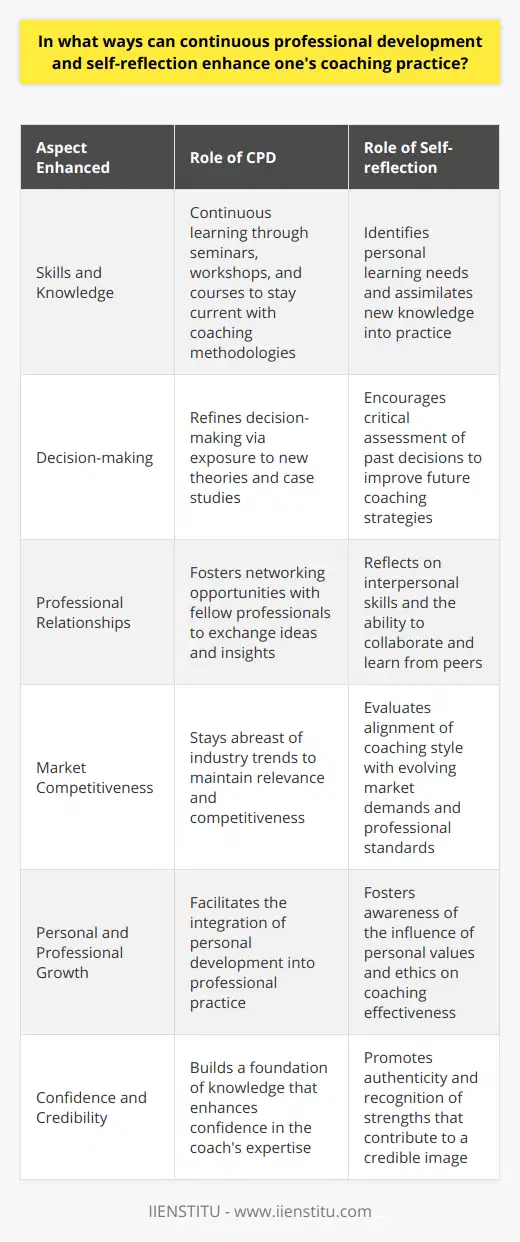
What are the tips of being a good coach?
Understanding Athlete Needs
A good coach first understands that each athlete is unique. Recognizing individual needs helps build rapport and trust, essential in coaching. A coach then assimilates their knowledge, tailors it to suit each athlete, ensuring progress.
Goal Setting and Communication
Setting clear, achievable goals is another significant quality. This not only mentally strengthens athletes but also keeps the coach and athlete on the same wavelength. Clear communication helps make sure the goals are well understood and achievable.
Demonstrative Skills
A coach should be able to demonstrate skills accurately. Demonstrations are the visual learning tools for athletes. Clear, accurate demonstrations help athletes better understand and replicate those moves.
Constructive Feedback
Constructive feedback is crucial. Athletes need a clear understanding of their strengths and areas requiring improvements. The coach's role is to provide this feedback in a positive, encouraging way.
Inculcating Resilience
Instilling resilience in athletes helps them cope with losses and setbacks. It's the coach's role to encourage athletes, help them overcome barriers, and instill a never-give-up spirit. They should also emphasize that failure is an essential part of the learning process.
Conclusion
Being a successful coach doesn't only depend on technical skills, but also on understanding athletes, setting goals, providing constructive feedback, and building resilience. Recognizing individual strengths, demonstrating skills correctly, and providing positive feedback are some of the attributes of a competent coach. By doing so, a coach can help athletes navigate their journey, motivate them, and enhance their performance.
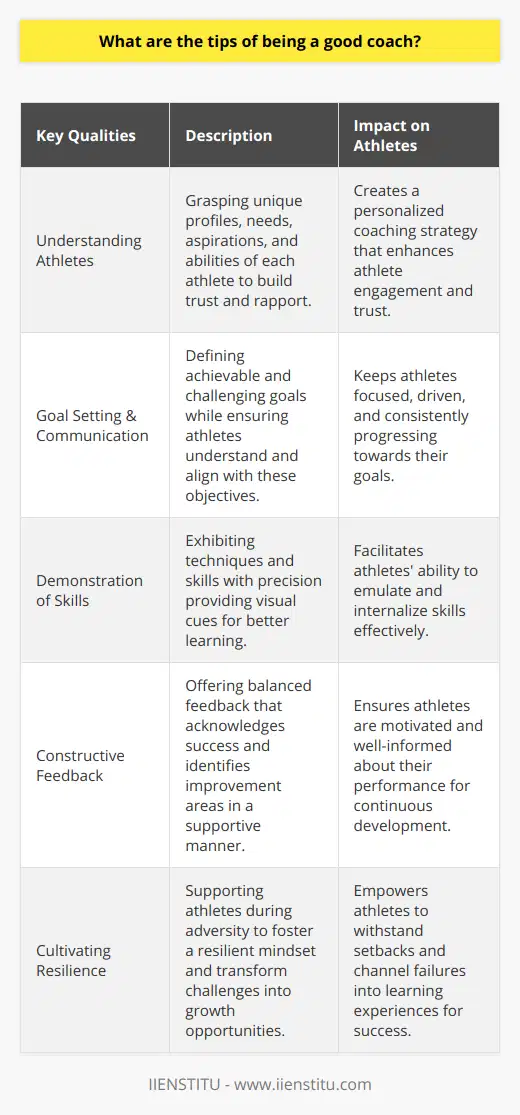
How can a coach develop the necessary skills and knowledge to excel in their profession?
Gaining Relevant Knowledge and Skills
To excel in their profession, a coach needs to develop both knowledge and skills. The first step involves gaining thorough knowledge in their particular field. An ice hockey coach, for example, must understand the game's rules, strategies, and techniques. This knowledge often comes from personal experience or formal education.
Personal Experience and Formal Education
Personal experience provides practical knowledge essential in decision-making processes during games. Formal education, however, equips coaches with theoretical understanding of sports science, psychology, and other relevant topics. Together, these sources of knowledge lay a strong foundation for a coaching career.
Further Education and Certification
To diversify and expand their knowledge base, coaches should pursue further education and certification. They can attend seminars, enroll in courses, or earn degrees that focus on coaching or related disciplines. These learning opportunities bring exposure to the latest strategies, trends, and scientific discoveries that can enhance their coaching approaches.
Skill Development through Practice
In addition to amassing knowledge, coaches must develop practical skills. Good communication, people management, and decision-making skills are vital in this profession. Experience plays a key role in skill development. By working with different teams and individuals, coaches polish their skills and learn to adapt to varying situations.
Learning from Others and Seeking Feedback
Coaches should remember that learning does not stop. They can learn significant lessons from other coaches, mentors, or players. Seeking feedback from their teams also provides valuable insights. This continuous learning process not only enhances their expertise but also fosters an environment of growth and development.
In conclusion, knowledge and skills development for a coach comes through a combination of personal experience, formal education, skill development through practice, and continuous learning. By focusing on these areas, coaches can ensure they excel in their profession.
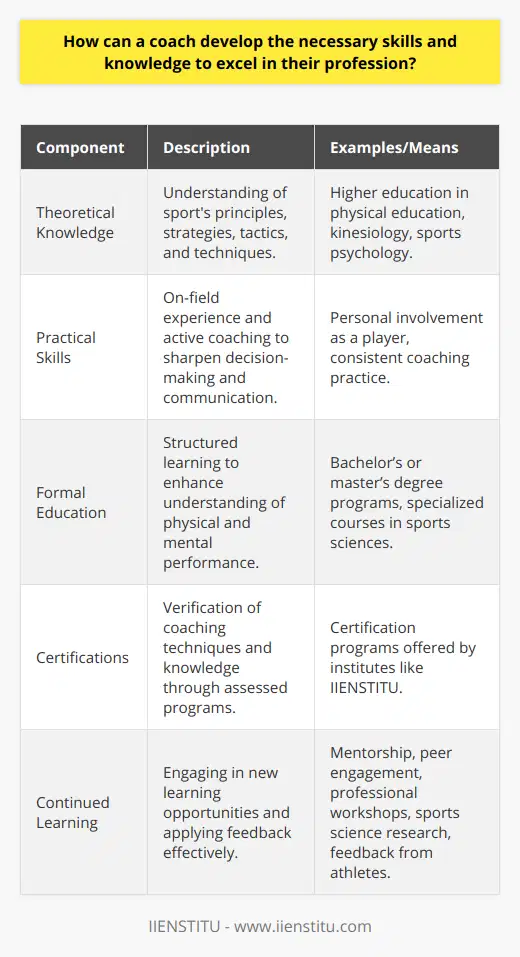
What are the key aspects of building and maintaining a successful coaching practice?
Understanding the Client’s Needs
A successful coaching practice starts with understanding the client's needs. This necessitates deeply listening to their concerns, and comprehending their goals. It's paramount to comprehend what the client seeks to get from coaching sessions and to customize coaching accordingly.
Building Trust with Clients
A vital aspect of coaching success is building trust with clients. To make the coaching process effective, coaches must establish honesty, confidence, and credibility. They must maintain a supportive and non-judgmental posture to foster trust and connection.
Maintaining Confidentiality
Maintaining confidentiality is a non-negotiable aspect of the coaching profession. Coaches must assure clients that their information remains safe. This principle underpins the coach-client relationship and promotes an environment of trust.
Developing a Structured Coaching Process
A well-structured coaching process stands necessary for a successful coaching practice. Coaches must define goals, track progress, and provide constructive feedback. This approach makes coaching constructive, strategic and directional.
Continuing Professional Development
In committing to the continuous professional development, coaches ensure that their knowledge and skills stay updated. This involves participating in training programs, certification courses, webinars, and workshops to stay abreast of recent coaching methods and techniques.
Promoting Practice through Marketing
Promoting a coaching practice can occur through various marketing strategies, such as social media marketing, referrals, networking, and webinars. Marketing increases visibility and helps acquire new clients, thus critical in making a coaching practice successful.
Establishing Sustainable Business Model
Lastly, establishing a sustainable business model underlies a successful coaching practice. It involves setting pricing strategies, managing finances, and maximizing returns on investment.
In conclusion, building and maintaining a successful coaching practice involves developing a client-centric approach, building trust, maintaining confidentiality, developing a structured coaching process, ensuring continuous professional development, promoting the practice through marketing, and establishing a sustainable business model.
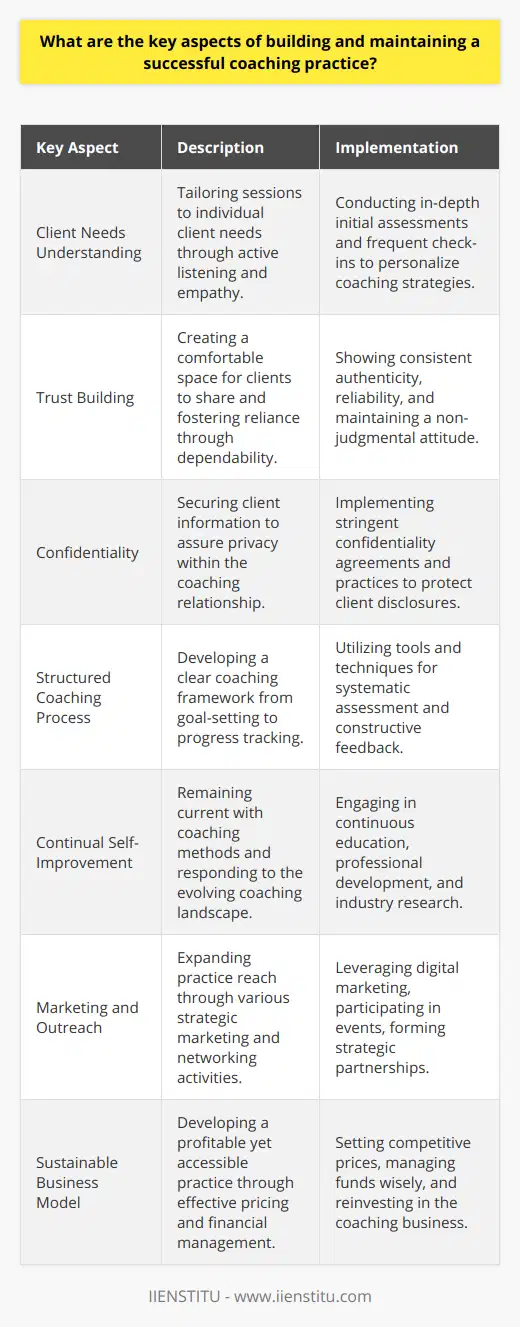
What are the critical components of establishing trust and rapport with clients in the coaching relationship?
Open Communication and Transparency
Open and honest communication forms a foundational component of any trust-based relationship. Coaches should explicitly articulate their processes, techniques, and the anticipated outcomes to the client. Providing clear expectations sets the stage for mutual understanding and respect.
Empathy and Understanding
Empathy, the ability to understand and share the feelings of another, plays a significant role in coaching relationships. Clients often seek coaches who can empathize with their experiences and challenges, ready to offer customized solutions based on that shared understanding.
Non-judgmental Attitude
A judgment-free environment encourages clients to open up about their issues without the fear of criticism. For a coaching relationship to flourish, maintaining a constructive and positive tone is essential. This approach fosters trust, allowing the client to feel safe and accepted.
Consistency
Being consistent in behaviors, responses, and actions fosters trust. Coaches who are uniform in their approach set a reliable precedent. This consistent behavior offers the client a sense of stability and predictability.
Confidentiality
The importance of confidentiality cannot be understated in a coaching relationship. Maintaining client privacy forms a crucial trust-building aspect. Thus, coaches should always work within ethical boundaries, ensure professional conduct, and respect client information.
Active Listening
Active listening allows the coach to fully understand the client's perspective, building a strong rapport. It includes not just hearing what the client says, but also identifying non-verbal cues, which often communicate unspoken thoughts and feelings.
Commitment to Client’s Goals
A commitment to achieving the client’s goals is another fundamental component for establishing rapport. When a coach invests their efforts toward achieving the client’s goals, it instills confidence, thereby enhancing the bonding.
In conclusion, establishing trust and rapport between client and coach isn't an overnight process; it requires time, effort, and the application of these mentioned principles. By developing these qualities, coaches can foster successful, long-lasting coaching relationships.
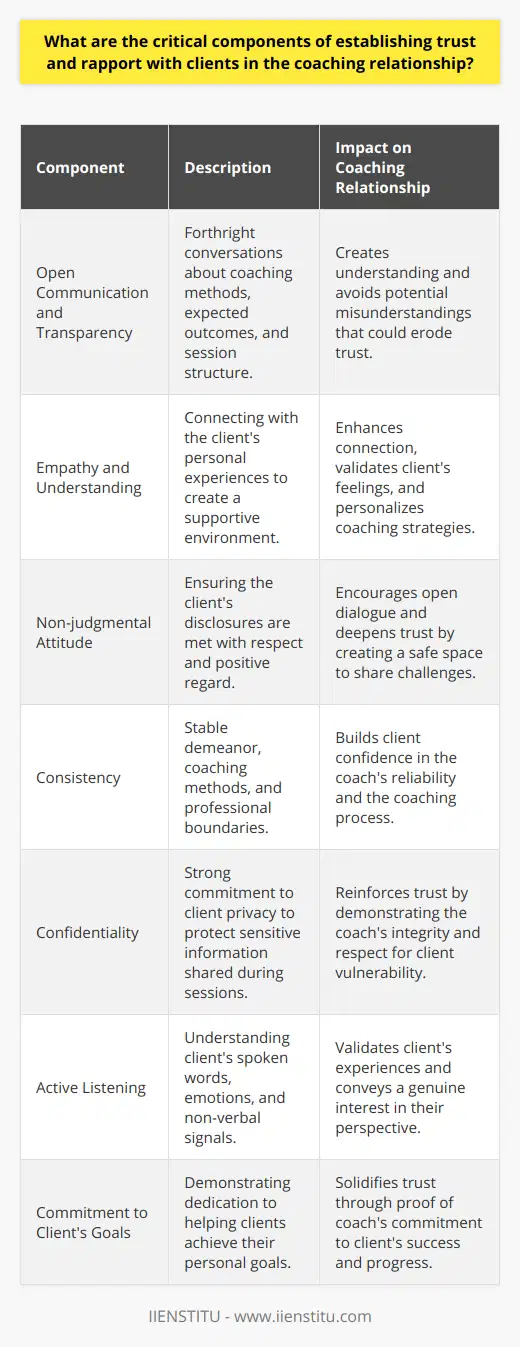
How can a professional coach effectively navigate and overcome common challenges or barriers that may arise during the coaching process?
Understanding Client Resistance
A significant challenge in the coaching process is client resistance. Coaches can effectively manage this challenge by understanding the client's perspective and exhibiting empathy. This approach leads to a comfortable environment where clients can freely express their feelings and concerns.
Adapting Communication Styles
Successful coaching also involves adapting communication styles to cater to different client needs. For instance, some clients might prefer a structured, task-oriented communication approach, while others might respond well to a more open, discourse-driven style. This adaptive approach ensures every client comprehends and receives coaching effectively.
Maintaining Confidentiality
An essential aspect of coaching that occasionally poses a challenge is maintaining client confidentiality. Strict adherence to privacy protocols helps bolster confidence and trust between the coach and the client, promoting effective engagement throughout the process.
Goal Settling and Tracking
Professional coaches often face challenges in settling and tracking goals. Building a cooperative relationship with the client can help in setting clear, realistic goals. Efficient tracking systems can also help monitor the client's progress and make adjustments if necessary.
Coping with Client's Lack of Commitment
Dealing with a lack of commitment from the client is another common challenge. Implementing incentives to encourage participation, providing constructive feedback, and making the coaching process interesting can enhance clients' commitment levels, hence ensuring the effectiveness of the coaching.
Balancing Directive and Non-directive Coaching
Determining when to use a directive or non-directive coaching style can be tricky. Balancing these different approaches depends on understanding the client's needs and the coaching situation. This balance promotes the coach's flexibility and effectiveness.
In conclusion, by understanding and effectively addressing these common challenges, professional coaches can maintain their effectiveness and enhance their client outcomes. It's vital to remain flexible and adaptive, while maintaining core coaching principles such as empathy, confidentiality, and clear goal setting.
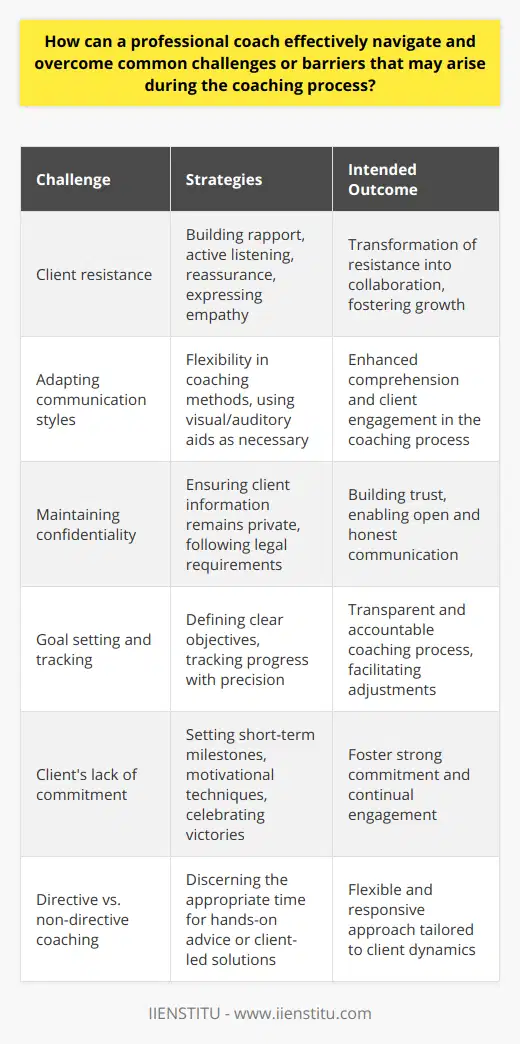
In what ways can a coach utilize various assessment tools and methodologies to provide valuable insights and facilitate meaningful growth for their clients?
Psychological Assessment Tools Usage
Coaches can apply numerous psychological assessment tools to glean crucial information about their clients. For instance, personality tests, like the Myers-Briggs Type Indicator, can uncover innate personality traits. They can illuminate behavioural tendencies that the client wasn't even aware existed.
Utility of Feedback Methodology
Through 360-degree feedback methodology, coaches can gather comprehensive evaluations from multiple sources. These could involve peers, subordinates, and superiors in the working context. This approach provides a holistic perspective on the client's effectiveness and areas in need of improvement.
Performance Assessment and Goal Setting
Performance assessment tools, such as the Balanced Scorecard or KPI metrics, enable the coach to quantify the clients' current competencies. This tool allows the coach to set precise goals and measure progress definitively. This quantitative approach helps bridge the gap between the client's present situation and their desired future.
Neurocognitive Assessments
Coaches can also employ neurocognitive assessments to understand how cognitive functions affect the clients' behaviour. These assessments can help determine factors like the client’s decision-making abilities, attention span, and problem-solving skills.
Drawbacks and Difficulties
Yet, the coach should consider the risks of over-reliance on assessments. They should use various tools to ensure a comprehensive understanding of the client. Moreover, they should pair these tools with their observations for a balanced evaluation.
In conclusion, balance and a broad arsenal of assessment tools and techniques present the key to facilitating meaningful growth in clients. By integrating a diverse range of assessments, coaches can create targeted, personalised strategies for their clients to ensure a successful coaching journey.
